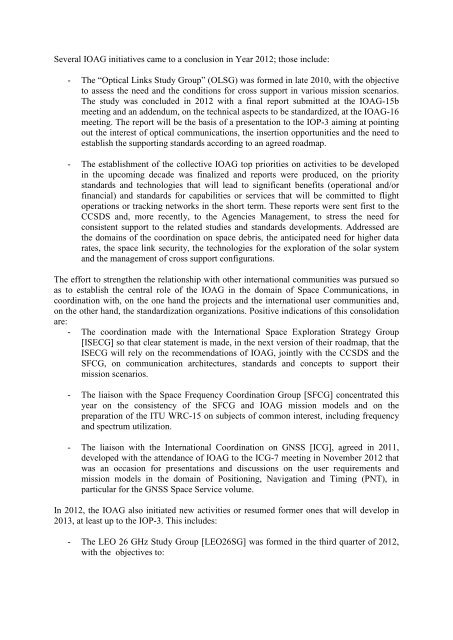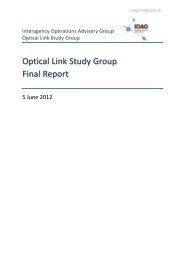IOAG 2012 Annual Report - Interagency Operations Advisory Group
IOAG 2012 Annual Report - Interagency Operations Advisory Group
IOAG 2012 Annual Report - Interagency Operations Advisory Group
Create successful ePaper yourself
Turn your PDF publications into a flip-book with our unique Google optimized e-Paper software.
Several <strong>IOAG</strong> initiatives came to a conclusion in Year <strong>2012</strong>; those include:<br />
- The “Optical Links Study <strong>Group</strong>” (OLSG) was formed in late 2010, with the objective<br />
to assess the need and the conditions for cross support in various mission scenarios.<br />
The study was concluded in <strong>2012</strong> with a final report submitted at the <strong>IOAG</strong>-15b<br />
meeting and an addendum, on the technical aspects to be standardized, at the <strong>IOAG</strong>-16<br />
meeting. The report will be the basis of a presentation to the IOP-3 aiming at pointing<br />
out the interest of optical communications, the insertion opportunities and the need to<br />
establish the supporting standards according to an agreed roadmap.<br />
- The establishment of the collective <strong>IOAG</strong> top priorities on activities to be developed<br />
in the upcoming decade was finalized and reports were produced, on the priority<br />
standards and technologies that will lead to significant benefits (operational and/or<br />
financial) and standards for capabilities or services that will be committed to flight<br />
operations or tracking networks in the short term. These reports were sent first to the<br />
CCSDS and, more recently, to the Agencies Management, to stress the need for<br />
consistent support to the related studies and standards developments. Addressed are<br />
the domains of the coordination on space debris, the anticipated need for higher data<br />
rates, the space link security, the technologies for the exploration of the solar system<br />
and the management of cross support configurations.<br />
The effort to strengthen the relationship with other international communities was pursued so<br />
as to establish the central role of the <strong>IOAG</strong> in the domain of Space Communications, in<br />
coordination with, on the one hand the projects and the international user communities and,<br />
on the other hand, the standardization organizations. Positive indications of this consolidation<br />
are:<br />
- The coordination made with the International Space Exploration Strategy <strong>Group</strong><br />
[ISECG] so that clear statement is made, in the next version of their roadmap, that the<br />
ISECG will rely on the recommendations of <strong>IOAG</strong>, jointly with the CCSDS and the<br />
SFCG, on communication architectures, standards and concepts to support their<br />
mission scenarios.<br />
- The liaison with the Space Frequency Coordination <strong>Group</strong> [SFCG] concentrated this<br />
year on the consistency of the SFCG and <strong>IOAG</strong> mission models and on the<br />
preparation of the ITU WRC-15 on subjects of common interest, including frequency<br />
and spectrum utilization.<br />
- The liaison with the International Coordination on GNSS [ICG], agreed in 2011,<br />
developed with the attendance of <strong>IOAG</strong> to the ICG-7 meeting in November <strong>2012</strong> that<br />
was an occasion for presentations and discussions on the user requirements and<br />
mission models in the domain of Positioning, Navigation and Timing (PNT), in<br />
particular for the GNSS Space Service volume.<br />
In <strong>2012</strong>, the <strong>IOAG</strong> also initiated new activities or resumed former ones that will develop in<br />
2013, at least up to the IOP-3. This includes:<br />
- The LEO 26 GHz Study <strong>Group</strong> [LEO26SG] was formed in the third quarter of <strong>2012</strong>,<br />
with the objectives to:



